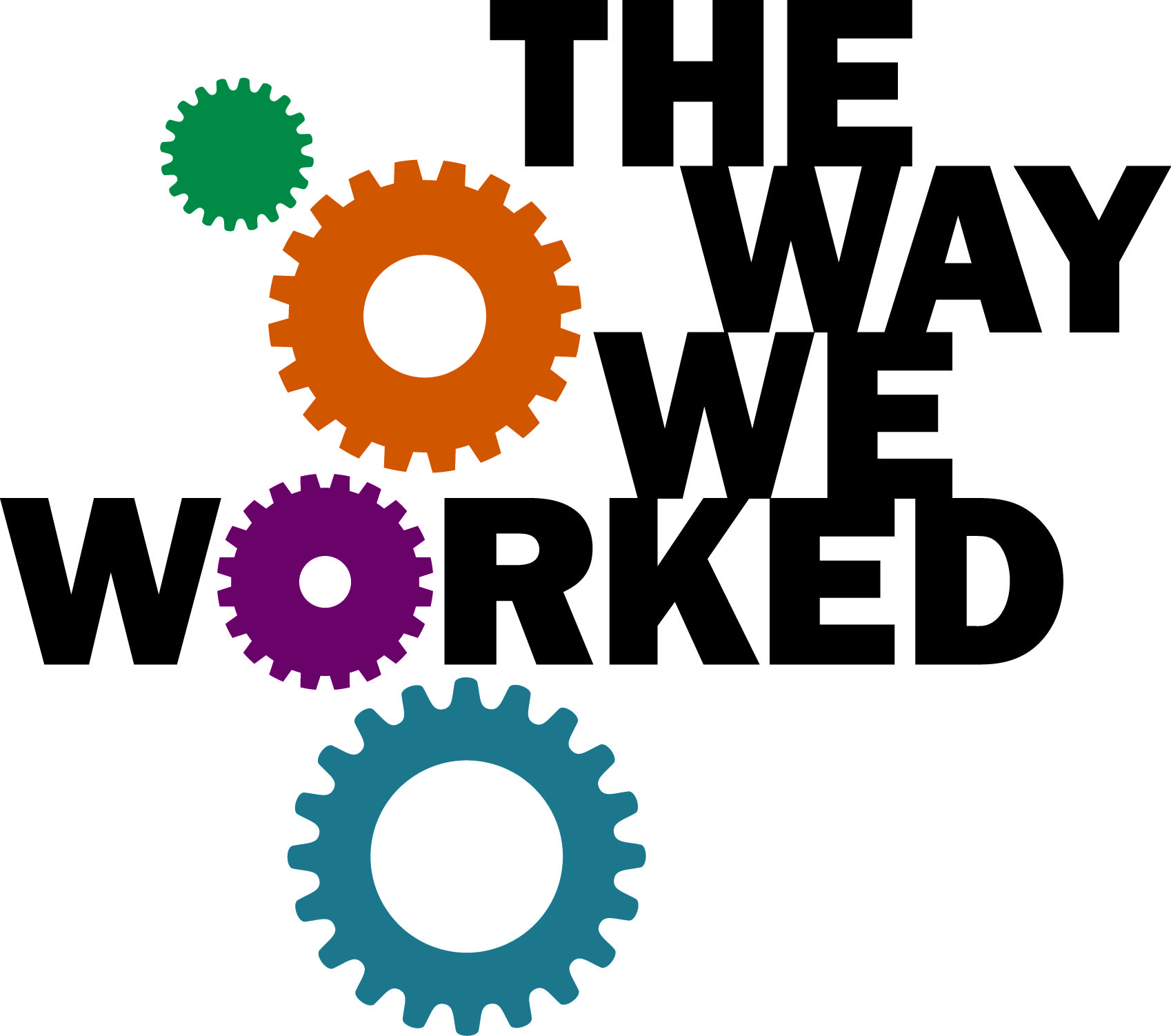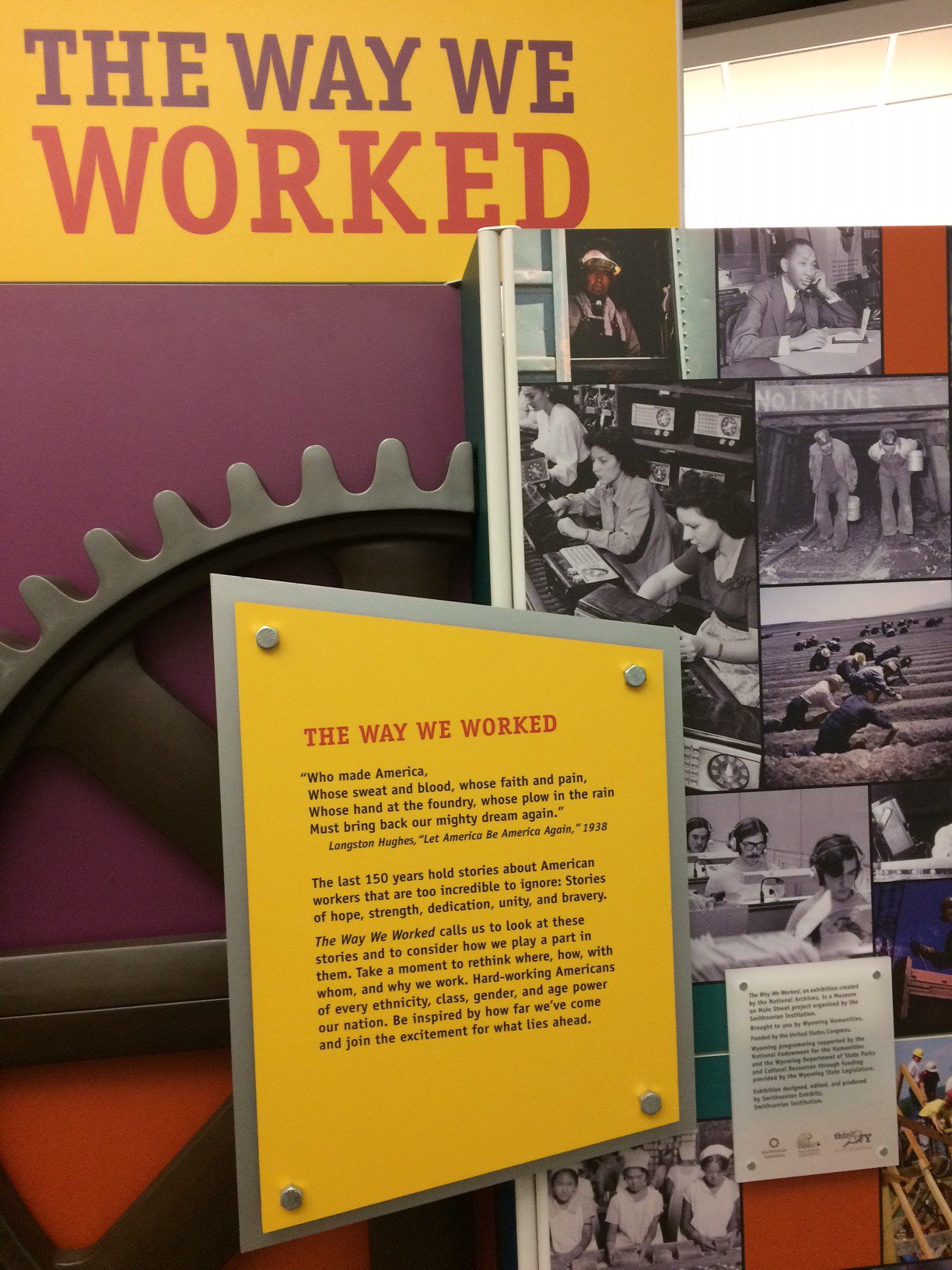 Who Made America? The Way We Worked exhibit comes to Laramie County Library to explore the answer to that very question.
Who Made America? The Way We Worked exhibit comes to Laramie County Library to explore the answer to that very question.
“Who made America/ Whose sweat and blood, whose faith and pain/ Whose hand at the foundry, whose plow in the rain/ Must bring back our mighty dream again.” These words from Langston Hughes’ 1938 poem, “Let America Be America Again,” are the introductory statement for the new The Way We Worked exhibit on display at the Laramie County Library from September 22 to November 13. Although the poem was written eighty years ago, the words continue to beseech us to reflect on what has made America the country it is today, and The Way We Worked exhibit echoes the sentiment, asking us to reflect upon the jobs, the technology, and the people who have worked to make America.
Try to imagine living in Cheyenne, but without firefighters, doctors, ranchers, teachers, rodeo contestants, roughnecks, or engineers. Or try to imagine what this part of the world would look like if the brave pioneers had not set out to settle the land in hopes of attaining their manifest destiny in the Wild West. Cheyenne wouldn’t be the place it is today. The people, both in the present and past, who work and have worked in the city are exactly what makes it such a special place to be. Today, the workers in Cheyenne are as diverse as their jobs, providing everything from safe bridges to delicious meals. Every day they, like other Americans around the country, go into work at factories, on farms, in the sky, in homes, in offices, and in all other sorts of places to make sure that our economy and society can function properly. Workers are integral to our city, to our state, and to our country and without them, life would not function on a day-to-day basis.
This is why the Laramie Country Library System is lucky to have been chosen by Wyoming Humanities to host The Way We Worked, a Smithsonian travelling exhibit that is part of Museum on Main Street—a national/state/local partnership to bring exhibitions and programs to rural cultural organizations. Thanks to the exhibit, community members will be able to explore different professions and learn more about the people who sustain American society.
The Way We Worked was adapted from an original exhibition developed by the National Archives and Records Administration, and explores how work is not only critical for the economy, but has also become a central element in American culture. For decades, people have been driven by the American Dream, and hoped to attain it by participating in diverse occupations, and the exhibit explores these different jobs by considering Why We Work, Where We Work, How We Work, and Who Works.
The exhibit incorporates artifacts, historical photographs, video footage, and audio clips from the National Archives’ rich collections into several different colorful and

interactive displays that are placed through the first and third floor of the library. Patrons can walk besides and beneath the displays and be completely immersed in the history of America’s workforce. You can also learn about library history by checking out the display case by the elevator on the first floor, which includes a 116 year-old brick from Cheyenne’s original Carnegie Library building! If you find the display interesting, you can purchase your own detailed history of the Carnegie Library here.
Thanks to Wendy Douglass from the Cheyenne Genealogical and Historical Society, there are also genealogical photos, facts, and artifacts arranged in display cases in the library’s entrance gallery. The displays include information about the pioneers who worked hard to settle in the west, and discusses the hardships they faced like malaria, wolves, and weather in pursuing their manifest destiny. Other display cases include facts about the strange, dirty, and sometimes gross jobs people used to have; you might be surprised what it took to make violin strings before the 17th century, and you’ll probably be shocked at what a groom of the stool had to endure!
You can come by the library to look at the colorful displays, you can check out the book of poetry that includes the entirety of Langston Hughes’ poem, you can research your own family’s work history, you can look up more facts about how workers made buildings in the 20th century, you can even call from your own phone and listen to Governor Matt Mead and other community members speak about why work and workers are so important to the state of Wyoming!
Each component of this interactive exhibit tells a piece of America’s work story, and by the time you explore each display, you will have a better understanding of how work has changed, advanced, and, persevered in America over the past 150 years.
So come on by the library to see how others work, to tell us how you work, and to see how everyone works together, and in doing so, discover who truly “made America.”
The exhibition will bring with it an array of free public programs including a discussion about blockchain and its future in Wyoming (October 4), a multi-media concert about Asian American experience in America (October 8), a presentation on the dark side of women’s work in the wild west (October 11), and a presentation on occupational genealogy (October 20). For a complete list of dates and times, click here or pick up a monthly calendar at any LCLS location.
All of these great events are free to the public. The Way We Worked has been made possible in Laramie County by Wyoming Humanities. The Way We Worked, an exhibition created by the National Archives, is part of Museum on Main Street, a collaboration between the Smithsonian Institution and State Humanities Councils nationwide. Support for Museum on Main Street has been provided by the United States Congress.
Contact
For the Laramie County Library, please contact Robin Papaleka, Adult Programming Coordinator, at 307-634-3561 or rpapaleka@lclsonline.org , or Kasey Storey at 307-634-3561 or kastorey@lclsonline.org for media information or to arrange interviews. For general library information, please call 307-634-3561 or visit lclsonline.org .
